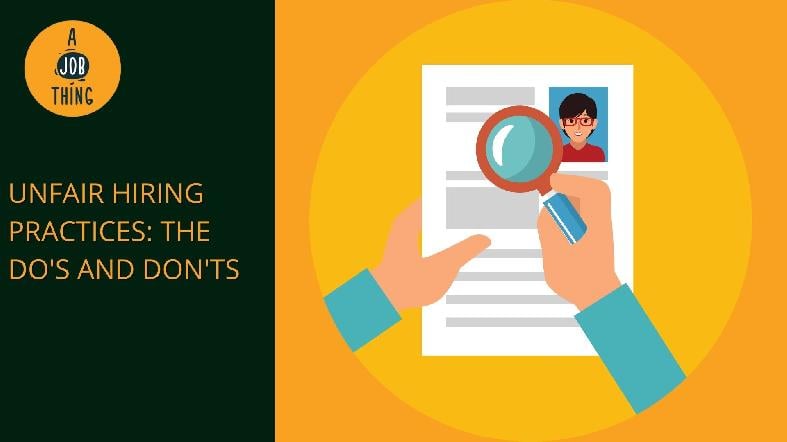
Avoid Unfair Hiring Practices: The Do’s and Don’ts
Are You Hiring?
Find candidates in 72 Hours with 5+ million talents in Maukerja Malaysia & Ricebowl using Job Ads.
Hire NowThe last thing a hiring manager should do is to have prejudices towards specific groups or individuals. Such unfair hiring practices are usually the result of hidden biases that are prevalent in recruitment processes.
Beyond being ethically questionable, it is bad for a business to have unfair recruitment practices. These practices can prevent a company from achieving its diversity-hiring targets and can come at a great cost. These are a few examples of unfair recruitment practices:
1. Vague job descriptions
The hiring manager must ensure that the job descriptions were written clearly and encourage qualified and diverse candidates to apply. It is best not to use words that signal a gender preference.
Some companies use words such as "strong" or "competitive", which are subconsciously perceived as male-specific, and "assist" and "support" to appeal to female candidates.
2. Unstructured interviews
Unstructured interviews do not use a set of prepared questions to create an informal, open-ended and friendly conversation. However, they lead to inconsistent results and unconscious bias.
A candidate's interview could reveal that they share the same interests as the interviewer, while another interview could focus entirely on the candidate's previous job. The recruiter might end up hiring an unfit candidate mainly due to their personal preference.
3. Too much focus on the resume
If an employer is in a rush to fill a post or is new to remote hiring, they might only use a candidate's resume to assess their suitability. However, they are unaware that 78% of resumes have misleading information.
Some studies say recruiters had unconsciously favour resumes with male names.
4. Lengthy recruitment process
Most employers require a phone interview or skills assessment and at least one in-person job interview. The candidates expect to go through two to four stages in the hiring process.
But when the hiring process has more steps, it can be unfair to the candidates with other commitments. Working parents or disabled candidates may struggle to attend an in-person interview multiple times. Those who work long shifts cannot take multiple phone interviews, and they may be forced to drop out of the interview process prematurely.
5. Deciding based on current work status
It is not illegal to find out a candidate's current employment status, but it could be unfair. Many hiring managers prefer employed candidates over unemployed ones.
Hiring based on current employed status can prevent a company from moving forward with potentially qualified candidates.

A recruitment process without any biases is a successful one.
How to fix unfair hiring practices
Fortunately, there are concrete steps a company can take to fix unfair hiring practices.
1. Blind hiring practices
Blind hiring is a method used to block out an applicant's personal information that could influence a hiring decision. It hides identifiable characteristics unrelated to the applicant's experience and job skills, such as:
-
Gender,
-
Ethnic background,
-
Education,
-
Age, and
-
Personal interests or hobbies.
2. Standardising skills testing
Skill testing offers two benefits:
-
Verifying the candidate's capability, and
-
Standardising the method used to assess applicants.
Assessment software allows interviewers to evaluate various technical and non-technical skills sans bias.
Skill testing also builds structure into the recruiting process. All candidates have an equal chance to perform based on the same questions.
3. Clear and transparent communication
Employers that are open about their hiring criteria, hiring process, and decisions provide a better candidate experience and avoid unfair hiring practices.
Transparency is key. Hiring managers should write clear job descriptions that excludes a list of preferred skills. List all the steps a candidate will take before reaching the final decision.
When the hiring manager decides not to move forward with a candidate, they should let them know ASAP.
It is always best to get rid of our conscious and unconscious biases. It will allow us to open our eyes and see what truly matters for the company.
Source: Vervoe
Articles that might interest you
What You Need to Know About Program Subsidi Upah (PSU) 4.0
Latest Dine-in SOPs for Phase One of the NRP
KPDNHEP Allows Further Relaxation to More Sub-Sectors

